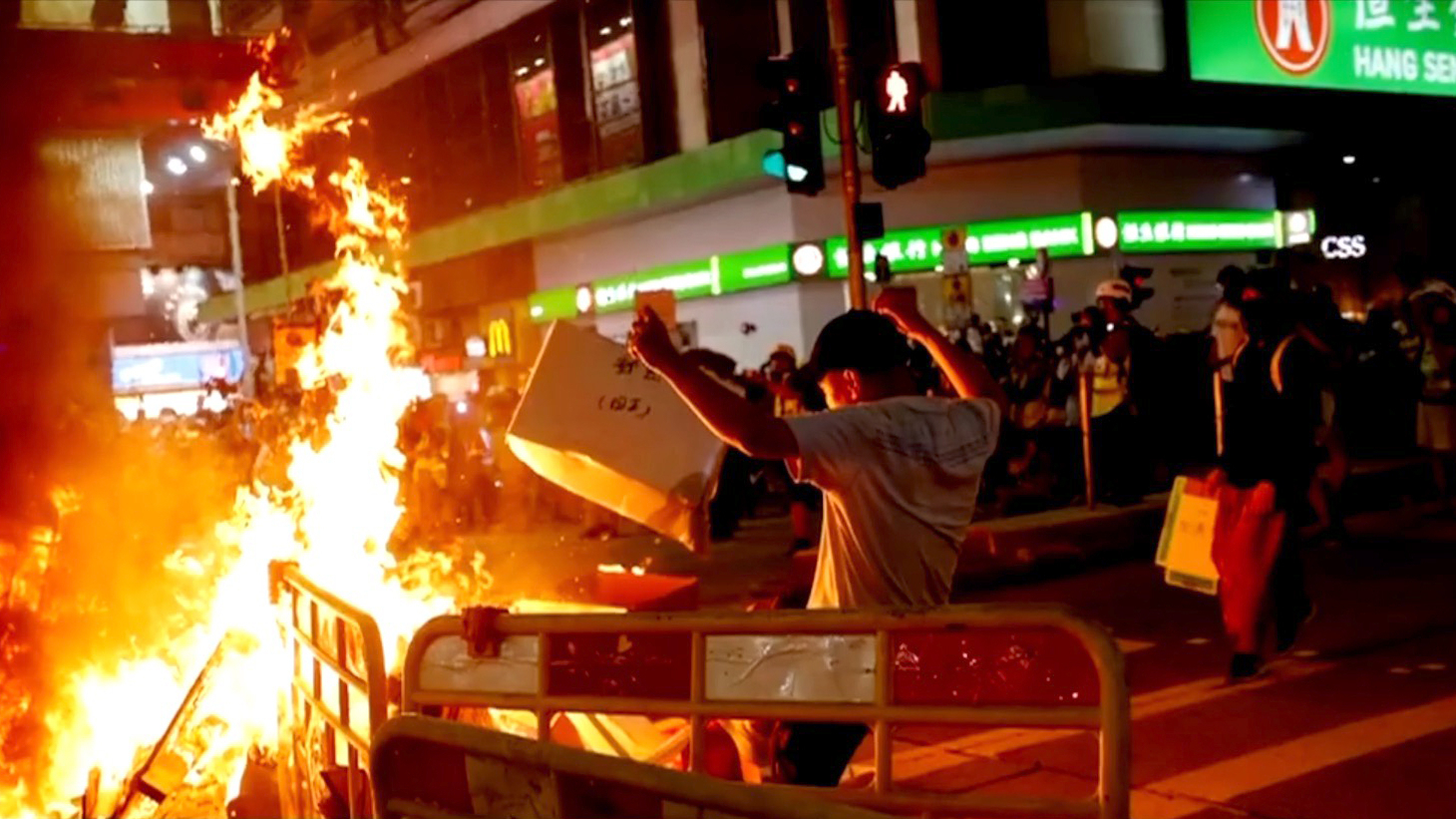

Editor's note: Bobby Naderi is a journalist, current affairs commentator, documentary filmmaker and member of the Writers Guild of Great Britain. The article reflects the author's opinions, and not necessarily the views of CGTN.
The violent protest leaders and masked rioters in Hong Kong are free to show themselves as a popular pro-democracy movement to the outside world. However, they cannot change the fact that they have close ties to American think tanks like the Foundation for Defense of Democracies, the National Endowment for Democracy, and the National Democratic Institute.
Together with soft-power outfits, the flamethrowers are trying to influence the violence and the xenophobic protests in a direction that will only benefit U.S. interests in the region. That explains why the motives and aims of the protesters are vague; why right-wing media tycoons with close ties to hardliners in Washington are backing their "democratic cause"; why although leader of Hong Kong, Chief Executive Carrie Lam, formally withdrew the fugitive bill to allay public concerns, the political crisis refuses to go away; and why the protests are now driven by a host of other objections.
This is not out of the ordinary. Of all the various twists and turns of the unrests in Hong Kong in the past three months or so, the effort by Washington to marginalize and stigmatize Beijing is among the more preposterous.
U.S. lawmakers have already sponsored the Hong Kong Human Rights and Democracy Act of 2019 to back the anti-government rioters. Sponsors and other advocates say the foreign-backed riots that have intermittently paralyzed transport links, shut street-level commerce, and slashed local tourism revenue will soon prompt a "yes" vote.
U.S. senators have also signed onto an identical bill aimed at supporting the rioters in Hong Kong. Little wonder their cronies keep marching in front of the U.S. consulate in the city with American flags to call for support from the U.S. government. U.S. policymakers and officials have even nominated Hong Kong protest leaders for peace prizes and pumped their organizations with money to "promote democracy."
The policy of the Trump administration is not officially to call for protests, but top officials have often made that clear in public too. Outlining his approach in May, Secretary of State Mike Pompeo met with Hong Kong's so-called pro-democracy leader Martin Lee, during which he expressed concern about the fugitive bill. This is while Hong Kong's matters are purely an internal affair for China and the central government in Beijing. Pompeo had no right to incite chaos there.

Protesters set fire outside a police station in Hong Kong's Kowloon area, September 7, 2019. /CGTN Photo
Overall, the notion that the people of Hong Kong are clamoring for the fall of the one country and two systems, or welcome American assistance in precipitating that fall is the same kind of "we will be greeted as liberators" nonsense the Bush administration believed in the lead-up to the Iraq War in 2003. People may want change and a better life in Hong Kong, but the Iraq-style collapse of their economy and system is surely not the kind of change they have in mind. Many peaceful protesters have already distanced themselves from violent protest leaders that are linked to outside powers.
The fact that American think tanks and local media tycoons are influencing the Trump administration's anti-China strategy is further evidence that Washington is not acting alone in supporting the rioters. The aim of their plan is not for China to pursue internal reform and external dialogue, but for the one country and two systems to collapse entirely so that it can no longer undermine their illicit interests and geostrategic designs in the South China Sea.
The flamethrowers should take note: This is an internal matter and the people of Hong Kong don't want their sympathy. They have been paying a heavy price for Washington's meddling in Hong Kong's internal affairs for too long. The last thing they want is for American think tanks and cronies to take to the Twitter to support their peaceful demands.
The "sympathy" coming from Washington is only designed to agitate for instability in Hong Kong from soft-power outfits that are pretending to care about people, their human rights, and their welfare. They actually couldn't care less about people.
Unlike what the flamethrowers would like to suggest, criticism is not same as violence or inflicting damage on public property, and certainly it cannot and shouldn't be allowed to undermine lives and security in the territory. They are in no position to sympathize with people through outrageous and insulting comments and bills. People attach no value to their opportunistic remarks and symbolic gestures.
To be sure, people know better than anyone else that a handful of those who destroy public property in Hong Kong are not peaceful protesters demanding a better life for themselves and others. They are anti-establishment and hostile individuals or groups directed and funded by external think tanks and soft-power outfits to undermine China's national security and territorial integrity.
With all of this in mind, the people of Hong Kong know just too well where they are headed, where they are in the region, what they should be doing to protect themselves, and what they should never expect from violent protest leaders that are photographed meeting with U.S. officials in Hong Kong, or for that matter, from American think tanks, lobbying groups, and soft-power outfits eager to benefit from the carnage. It's a formula for catastrophe, as in all catastrophic situations.
(If you want to contribute and have specific expertise, please contact us at opinions@cgtn.com.)

Copyright © 2018 CGTN. Beijing ICP prepared NO.16065310-3
Copyright © 2018 CGTN. Beijing ICP prepared NO.16065310-3